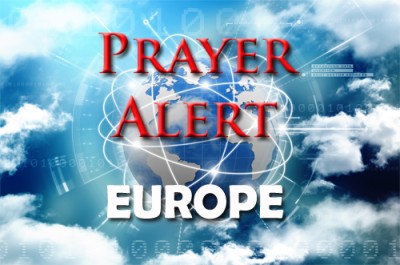‘I have no fear’, says singer with cancer
15 May 2025Brad Arnold, lead singer of the rock band 3 Doors Down, has publicly revealed his battle with stage-four clear cell renal carcinoma, a cancer that has metastasised to his lungs. Despite the grave diagnosis, Arnold’s response is one of unshaken faith and peace. In a heartfelt video message, he declared, 'We serve a mighty God and He can overcome anything... I have no fear.' He has cancelled his summer tour to begin treatment and humbly asked fans for prayer. Arnold has used his platform to share the Gospel boldly in concert settings, often reminding audiences that the messages of worthlessness perpetuated by society are lies. 'You are enough… because Jesus Christ loves you’, he told fans during a recent show. His testimony continues to inspire many, and his story is a compelling call to pray, believe, and speak hope in life’s darkest trials.
UK economy expands at fastest pace in a year
15 May 2025The UK economy grew by 0.7% in the first quarter of 2025 - its fastest quarterly growth in over a year - beating Bank of England predictions. Growth was driven by strong performance in the services sector, especially retail, IT, advertising, and car leasing. Manufacturing also saw a 1.1% rise, while construction remained flat. Compared to last year, the economy is now 1.3% larger. Export activity also surged, with a 3.5% jump as traders raced to beat looming US tariffs. Despite this strong start, economists warn the momentum may be short-lived due to domestic tax increases and international trade pressures. Some of the early-year growth appears to have been brought forward ahead of rising business costs. While consumer confidence and easing interest rates offer hope, the Bank of England believes underlying growth may still be weak. The government remains cautiously optimistic, pointing to rising wages and a stronger-than-expected recovery, yet future growth may depend on global stability and wise economic governance.
The Government is set to release over 1,000 recalled inmates early in an effort to relieve severe overcrowding in prisons. Offenders serving one to four-year sentences who breached licence conditions, but did not reoffend, will now be released after 28 days without parole board assessment. Justice secretary Shabana Mahmood said the move, alongside a £4.7 billion prison-building plan, is necessary to prevent the system from collapsing, with England on course to run out of male prison spaces by November. Critics argue the policy puts public safety at risk. Victims’ advocates warned that the policy could endanger lives, especially where abusers are concerned. The justice ministry faces growing pressure to reform sentencing, with recommendations for expanded use of community-based alternatives expected soon. However, many argue that without stronger investment in probation, mental health services, and preventative support, early release schemes alone will not solve the crisis. See also
GPs split over assisted dying plans, says BBC
15 May 2025A BBC survey of over a thousand family doctors reveals sharp divisions among GPs in England over proposed assisted dying legislation. About 500 opposed the law, calling it dangerous, unethical, and a threat to patient trust. Concerns included coercion, guilt among patients feeling burdensome, and the sanctity of life. Others warned that better palliative care should be prioritised over legalising assisted death. Over half cited religious beliefs as a key reason for opposition. Conversely, around 400 GPs supported the bill, often citing personal trauma from witnessing painful deaths and arguing for dignity and patient autonomy. Supporters described the proposal as humane and overdue, with many wanting the choice for themselves or loved ones. Nearly 300 GPs would assess patient eligibility if the law passed. However, over a quarter of all respondents admitted difficulty in reliably predicting life expectancy - central to the proposed law’s safeguards. As Parliament prepares to debate the bill, questions remain over ethical boundaries, medical responsibility, and protecting the vulnerable amid calls for better end-of-life care. See
DWP crackdown to hit 150,000 PIP claimants
15 May 2025Major changes to the Personal Independence Payment (PIP) system are set to affect hundreds of thousands of vulnerable people across the UK. The Government’s welfare reform, due to begin in 2026, will raise the threshold for eligibility for the daily living component of PIP - a benefit that supports individuals with disabilities and their carers. Under the new system, claimants must score at least four points in one assessed activity to qualify. By 2029/30, around 800,000 people are expected to lose this benefit, with 150,000 also losing their carer’s allowance. Critics say that these reforms prioritise cost savings over care and compassion. Veteran MP Diane Abbott described the legislation as 'cruel and misconceived’, warning that it will push disabled individuals into further hardship and fear. With weekly payments of up to £110.40 at stake, the changes could leave many struggling to cope financially and emotionally. Disability campaigners and church leaders are calling for justice, dignity, and adequate provision for society’s most vulnerable.
France accused of encouraging people-smuggling
15 May 2025Fresh controversy has erupted after video footage emerged showing French border officers handing life jackets to migrants mid-Channel, fuelling claims that France is aiding illegal crossings rather than preventing them. The footage, captured by migrants, shows a French patrol vessel approaching a small migrant boat and supplying safety vests. Critics, including Shadow Home Secretary Chris Philp and former Border Force chief Tony Smith, argue this action undermines UK-funded efforts to stop smuggling and sends the wrong message to those attempting the journey. Smith insists that if the French can approach boats at sea, they should redirect them back to French shores. With over 11,500 crossings recorded by early May (up 35% from last year), the Government faces mounting pressure to resolve the crisis. Officials stress that life jackets are distributed based on safety assessments, but the video has triggered strong political backlash. The Home Office reaffirmed its goal to dismantle smuggling networks exploiting vulnerable people for profit, as calls grow for firmer preventative measures.
The Church of England’s process to appoint the next Archbishop of Canterbury has been described as an 'omnishambles'. Following Justin Welby’s resignation, the post has been vacant since January. Although an announcement was expected this autumn, the appointment may now be delayed due to three vacant positions on the Crown Nominations Commission (CNC), which must be filled by elected members from the Diocese of Canterbury. Complications arose when the General Synod changed eligibility rules mid-process, introducing gender and clergy-lay balance requirements. This disqualified several previously nominated individuals and enabled the selection of others who had received little or no diocesan support. Critics argue that the diocese applied new rules incorrectly, bypassing normal procedures. Despite the confusion, the CNC hopes to maintain its original timetable, with key meetings scheduled for May, July, and September. A recent public consultation on the future Archbishop received nearly ten thousand responses, reflecting widespread interest and concern over this pivotal appointment in the Anglican Communion.
Peace efforts between Russia and Ukraine took a cautious step forward as Russian delegates arrived in Istanbul on 15 May for proposed negotiations. Volodymyr Zelensky had invited Vladimir Putin to meet in person, but Putin declined, appointing aide Vladimir Medinsky to lead Russia’s delegation. The absence of top Russian officials, including foreign minister Sergey Lavrov, cast doubt on Moscow’s seriousness. Ukraine, emphasising the need for high-level talks, questioned the format and substance of the meeting. Zelensky said he would decide Ukraine’s response after seeing Russia’s true intentions. Ukraine and its allies had urged an unconditional ceasefire from 12 May, a proposal Moscow ignored. Donald Trump, who at one stage expressed interest in attending, will not participate, though Marco Rubio, Steve Witkoff, and NATO secretary Mark Rutte could do so. The situation remains fluid, with uncertainty surrounding whether the talks will lead to meaningful de-escalation or remain another missed opportunity.







